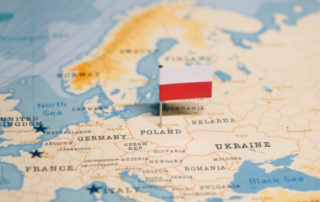With Russia mired in Ukraine and Iran awaiting a strike from Israel, Vladimir Putin’s move to host 36 countries presents menacing image to a West plagued by polarization and disaffection with domestic issues. The new BRICS conference not only includes Russia, Brazil, India, China, and South Africa as the “core” of the geopolitical and economic bloc, but also counts Egypt, the United Arab Emirates, Ethiopia, and Iran among new attendees. A common theory behind the new conference is Putin’s effort to show that it not only is not isolated, but is part of an emerging non-Western global order.
Formed in 2009, the BRICS (Brazil, Russia, India, China, South Africa) emerged as a way of geopolitically and economically aligning some of the largest emerging economies after the 2008 financial crisis. Today, the bloc accounts for 45% of the world’s population and 28% of the global economy. Economically that is all well and good; however, in light of the wars in Ukraine and the Middle East, the risk of the BRICS taking an overtly anti-establishment stance is a focus of concern in the Western foreign policy world. At the same time, a closer look at the BRICS reveals a far-less cohesive bloc than feared in the West and aspired to by Putin and Xi Jinping.
The security risks to the West of a hostile bloc of that size are obvious. Both the United States and Europe are politically polarized between increasingly populist electorates and shaky establishment political parties. The North Atlantic Treaty Organization (NATO) is anemic, as even former NATO Secretary Jens Stoltenberg has acknowledged European neglect of contributing to Western defense. For reasons both ideological and geopolitical, America is showing greater interest in securing its interests in the Pacific than it is in continuing to safeguard Europe.
Despite Russia’s hopes of the BRICS dislodging the Western pressure that is frustrating their gains in Ukraine, the BRICS are neither inherently anti-Western nor are they cohesive. Certainly, Iran and China are in the anti-Western camp. Iran has contributed short-range missiles to Russia’s war effort in Europe. This is in addition to the standing collaboration between Moscow and on drone development. China has been quieter in its support of Russia, but is more consequential in its effect. China has negated much of the Western sanctions on Russia, by working with it to create an alternative financial system to that offered by West in the SWIFT system.
Within the BRICS, Brazil and India are different animals entirely. Brazil has never been explicitly pro or anti-Western. Brazil’s previous presidential administration under Jair Bolsonaro enjoyed a cordial relationship under Donald Trump. Under the succeeding and current administration of Luiz Inacio Lula da Silva, Brasilia and Washington are still currently cordial with the Biden administration on the American side. With domestic political mismatch between the US and Brazil being a deciding factor in relations, Russia has anything but an anti-Western stalwart in the South American powerhouse.
In South Asia, India and Iran are even less reliable for Russia and China hoping to create a strong alternative to the West. In Iran, the fundamentalist theocracy that has ruled since 1979 could end at any time. After two failed missile attacks on Israel, and quickly losing its proxies in Hamas and Hezbollah in the Middle East, Tehran is nervously bracing for what could be the end of its time in power. Israel has reportedly stated its intent to disable Iran’s military capacity and let the country’s citizens finish the job of changing political power in Tehran. If Iran descends into a failed state, democratizes, or morphs into a constitutional monarchy under a return of the royal family, Russia and China lose a lynchpin of its designs on reshaping Eurasia.
To Iran’s southeast, India is an even bigger liability to the BRICS becoming an anti-Western system. India and the US have been growing closer since the early 2000s. India is a member of the anti-China “QUAD” group that includes Japan, Australia, and the US. New Delhi is rightly concerned about Beijing’s efforts to encircle it in the Indian Ocean with naval bases and economically in the Belt and Road Initiative (BRI). The India-Middle East-Europe Economic Corridor (IMEC) which was announced in September 2023 outlines the creation of an economic system that conspicuously links India through the Gulf States and Israel in the Middle East to Europe in the West. With the US as a partner, India’s involvement in the IMEC shows that New Delhi is becoming an independent decisionmaker in its own right and will not be simply a cog in an anti-Western geopolitical wheel.
During the Cold War, Russia enjoyed hegemony in what was otherwise a closed statist economic system. While Vladimir Putin may be trying to resurrect a new Russian Empire by extending influence in the Caucasus and East Europe, the BRICS are anything but a new version of what Moscow enjoyed during the Cold War. South American elections, India’s geopolitical autonomy, and Iran’s moribund theocrats are wild cards in a game that Russia is likely to lose.
Economically, replacing the US dollar as a reserve currency may prove more threatening to the West. For Russia and Beijing, there are problems there too. Currency value ultimately depends on trust and trade. The BRICS have the market size to replace the dollar in transactions if they chose to adopt a common currency for cross-border transactions. Moscow’s idea of an alternative to SWIFT by linking BRICS member-state commercial banks to their central banks, and clearing payments with a digital token, may work to a degree. At the same time, trust and the ability of institutions and currency holders to understand the currencies they prefer is more critical to its success. America’s ability to resume acting as an energy exporter, its market size, and its inclusion in the IMEC will blunt these Moscow-led efforts.
The biggest geopolitical risk to the West is the West itself. Washington’s current national debt of over $35 trillion and over $103,000 per US citizen is a bigger threat to the Western order than anything coming out of Russia. Even more problematic for the West is the seeming inability of democracies to rein in their own deficit-based spending. Even if the West goes economic the way of Weimar Germany, the order it created will not have ended because of the BRICS. The biggest threat to the West is its own macroeconomic incompetence.



